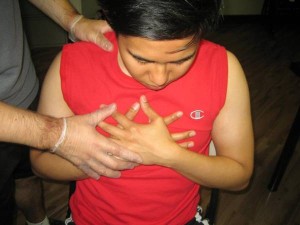An enlarged heart is called as cardiomegaly. There are various types of cardiomyopathy with each causing different effects. An enlarged heart can be triggered by coronary artery disease, high blood pressure, congenital heart defects and certain viral conditions. Both children and adults can be affected but it most often occurs among adults over 20 and has a higher incidence among men.
Chest pain
If an individual has an enlarged heart, one of the distinguishing symptoms is chest pain. The chest pain is called angina and can manifest when the individual is at rest or when he/she attempts to engage in an activity or exercise routine. Those who suffer from cardiomyopathy will experience difficulty during exertion and often limited due to the chest pain. This simply means that the individual could not engage in any strenuous activity.

Extreme fatigue
A common symptom of an enlarged heart is extreme weakness and fatigue. Since the heart could no longer pump blood effectively all over the body, the muscles, tissues and organs will not receive enough oxygen and nutrients to function properly. Those who suffer from cardiomyopathy will find it difficult to engage in any kind of activity. Even activities of daily living such as taking a shower, getting dressed or simply walking can be strenuous for those who have an enlarged heart.
Edema
There are certain types of cardiomyopathy that can cause swelling or edema throughout the body. Since the heart could not effectively pump blood out of its chambers, the blood backs up into the venous system, thus causing edema in the ankles, feet, hands, lower legs and even the abdomen. If you want to learn how to properly manage edema, click here.
Shortness of breath
Shortness of breath or dyspnea occurs since the heart could no longer empty blood out of its chambers when it pumps. The blood backs up into the lungs which causes shortness of breath and coughing. The individual should keep the head elevated while sleeping using several cushions or pillows since the dyspnea is aggravated when reclining. In most cases, oxygen therapy might be administered so that the individual can perform activities of daily living.
Arrhythmias
Whether the enlarged heart is triggered by a stiff or thickened left ventricle during hypertrophic cardiomyopathy or a dilated cardiomyopathy, erratic heart rhythms commonly occur and considered as serious symptoms. The arrhythmias can cause chest pain, fainting, shortness of breath and sudden death. Those who have arrhythmia often need medications or an implanted cardioverter defibrillator to control or stop the arrhythmias. In some cases an ICD is also used which is similar to a pacemaker but used to deliver electrical energy directly to the heart once it senses a dangerous arrhythmia such as ventricular fibrillation which can cause sudden death.
